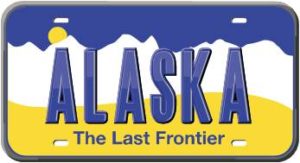Being Vegetarian as an Alaskan

By Audrey Hunt, VRG Intern
I have lived in Anchorage, Alaska my whole life and I can tell you that not everyone here is hunting moose and fishing for salmon to stay alive through the winters. Until I was around twelve years old, I was a huge meat and dairy eater. I grew up eating ribs, medium-rare steaks, and roasted chicken for dinner. Eggs and bacon were my breakfast, and always a turkey sandwich for lunch. Sometimes if it was a special day, I would get smoked salmon, freshly caught for a snack. Every time I was able to go out to eat with my family on a ‘special occasion,’ it would most likely be at a local Alaskan restaurant that would always serve the freshest seafood. I absolutely loved seafood. Crab legs, halibut, and of course, Alaskan king salmon.
One day at school when I was in the fifth grade, I noticed a girl my age eating fish eggs on toast. She was originally from Russia and always brought the weirdest lunches. I found myself being completely repulsed from her meal. I thought to myself, “Why would you ever eat unborn fish and simply put it on toast?” I looked down at my lunch and saw a hard-boiled egg and a turkey sandwich, and that’s when I had my first epiphany, “What makes her lunch weird and mine normal?”
From that day, I began to learn more about different cultures’ diets and how they got their major food sources. As an Alaskan, you learn a lot about the different Alaskan tribes and their diets. For example, the Athabaskan tribe1 lived off of caribou, moose, and mountain goat meat during the year; they even ate off the antlers. The Inuit eat mostly fish and seal. In every textbook and every Native Center I’ve visited, all have labeled the traditional Alaskan Native diet as “ideal” or “healthy.” I thought about the term, “tradition” and how it comes into play with our diet.
A classic family ritual in Alaska, or even in all of America is to hunt and fish with your family. Many people come to Alaska to catch king salmon that flow in during spawning season in the Kenai River or hunt moose in Denali. Hunting began as a practice for survival, during a time when resources were sparse and famine was heavily influenced. Now hunting is looked at as a sport or an activity that the family will go out and do a couple of times during the summer. Especially in Alaska, you will always find deer heads, bear rugs, and stuffed ducks as normal house decor items. The act of shopping at the local Cabela’s and getting all the camo you can get with a brand new gun to match is heavily accepted here. Why do we still hunt, especially when the majority of Alaskans are shopping at groceries now? I’ve come to find out that it is simply tradition.
There are many pros and challenges when being vegetarian while living in
Alaska. One of the biggest pros for me personally, is that veganism is a
growing trend even in Alaska.
It is very accessible to buy plant-based milk and meat-less brands at our local
grocery stores. Since being vegetarian, I haven’t had a problem finding
alternative meals just at Fred Meyers, a local supermarket. Each year is
growing in these products as well, which shows that more and more people are
wanting these food items. Anchorage,
Alaska specifically, has been
emerged in vegan-friendly restaurants, my favorite being Middle Way Cafe, which
has become a tourist favorite as well.
However, there are many challenges when first transitioning to a vegan
or vegetarian while living in Alaska. For one, animal meat is very accessible
here. Fish are filled in our rivers, and catching your own is a fun family
activity for many. Also, the cost of living is high in Alaska, so many people
find it worth the fishing trip. Most Alaskan families make salmon for dinner,
and it has been a label for a lot of Alaskans to be “fish-eaters.” There is a
slight stigma on vegetarians, even in the major city. I don’t know many
vegetarians from Alaska, however, the majority
that I have met are around college-aged. When being open about wanting to go
vegetarian, it was a personal struggle to try to explain my reasoning to my
family and friends. There are so little people on “your side,” I constantly
felt like I was walking on glass when discussing the topic.
While living and growing up in Anchorage, Alaska for the past eighteen years, I have accepted the challenges that come with being vegetarian, while also appreciating the growing population of vegetarians worldwide. Everyone has a different journey when transitioning to a plant-based diet, and for me, it has only been an uplifting experience. Don’t ever let the stereotypes from where you are from define you as a person, let alone, your diet. I had to personally go through the battle of feeling like I was letting my family and friends down that I didn’t believe what they did, which wasn’t the case at all. At the end of the day, do what makes you flourish, and eat the foods that make you happy.
[1] “U*X*L Encyclopedia of Native American Tribes. Encyclopedia.com. 11 Aug. 2020” Encyclopedia.com, 27 Sept. 2020, www.encyclopedia.com/humanities/encyclopedias-almanacs-transcripts-and-maps/alaskan-athabaskan
To read about experiences of other young people, see: https://www.vrg.org/teen/#friends
The contents of this posting, our website, and our other publications, including Vegetarian Journal, are not intended to provide personal medical advice. Medical advice should be obtained from a qualified health professional. We often depend on product and ingredient information from company statements. It is impossible to be 100% sure about a statement, info can change, people have different views, and mistakes can be made. Please use your best judgment about whether a product is suitable for you. To be sure, do further research or confirmation on your own.
